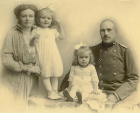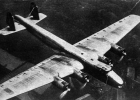Europe
From the fall of Napoleon to Revolution in Russia and from the rise of Hitler to the fall of the Berlin Wall this period is one of major upheaval in Europe. We see the collapse of monarchies and empires and the changing status of women and working men. This is a time that witnesses the mass displacement of peoples and genocide on a scale never seen before it is also a time that sees changes in medicine and technology that make fundamental changes to our everyday lives. Read more
Sort by:
Date (Newest first) | Title A-Z
Show:
All |
Articles |
Podcasts |
Multipage Articles
-

Social Darwinism: the myth and its reinvention
ArticleClick to view -

Real Lives: A German captain’s perspective on the end of WWI
ArticleClick to view -

Recorded webinar: Mapping uncertainty - Holocaust Memorial Day 2025
ArticleClick to view -

‘The Nazi Service’? The Prussian origins of the Luftwaffe
ArticleClick to view -

Film: A conversation on Goethe with A.N. Wilson
ArticleClick to view -

Films: Khrushchev – Interpretations
9th October 2024Click to view -

Film: Khrushchev - Background
ArticleClick to view -

The Importance of Truth, Quality and Objectivity in the BBC German Service from 1938 to 1945
ArticleClick to view -

Political and social attitudes underpinning the 1924 Olympics
ArticleClick to view -

Crowdsourcing the heritage of the Second World War
ArticleClick to view -

Bonapartism after Napoleon III: the Prince Imperial and Eugene Loudun
ArticleClick to view -

Forbidden friendships: taverns, nightclubs, bottle bars and emancipation
ArticleClick to view -

The United Nations Convention on the Prevention and Punishment of the Crime of Genocide
ArticleClick to view -

Women and the French Revolution: the start of the modern feminist movement
ArticleClick to view -

Film: The Two German Economies
ArticleClick to view -

Film: Ideas and Ideology
ArticleClick to view -

Film: Social & Cultural Change
ArticleClick to view -

Film: Key Personalities and Opposition
ArticleClick to view -

Film: Germany 1945-1991: Introduction
ArticleClick to view -

Film: The Weimar Republic
ArticleClick to view

